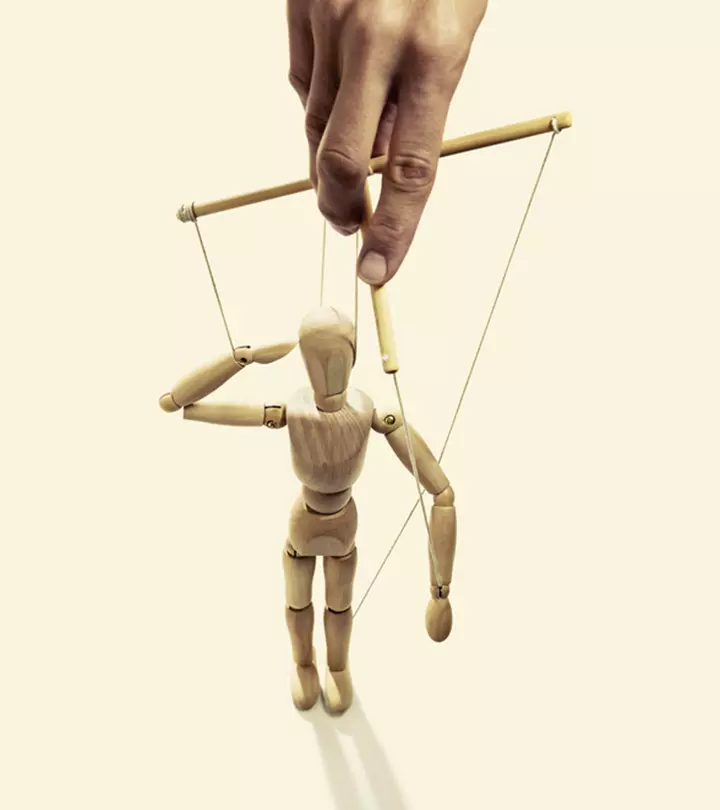Signs Of Manipulation: 19 Key Tactics To Watch For
Keep an eye out for these signs and save yourself from manipulative people around you.

Image: Shutterstock
A manipulative person is not fun to be around. You may ignore the signs of manipulation and even coercion because you love that person.
They are charming, get what they want, and are persistent in their endeavors. But, you may always have the feeling that something is not right. Sometimes, if your gut says that they are taking advantage of you or someone else, they probably are. Many people are master manipulators when it comes to work, money, relationships, and life. They are also incredibly narcissistic (1). Moreover, they use their high EQ to understand other people’s needs and emotionally manipulate them (2). Read on to learn about the signs of manipulation to look out for.
In This Article
Understanding Manipulative Behavior
Manipulative behavior involves controlling someone in a deceptive manner to serve your own personal interests. People who engage in manipulation often use tactics like guilt-tripping, gaslighting, or playing the victim to make others feel obligated.
Manipulators exploit emotional vulnerabilities by pressuring their targets to comply with their demands. They either appear sad and distraught or angry if you do not listen to them.
Recognizing manipulative behavior can be difficult, as it often disguises itself as concern. It typically results in one-sided benefits and leaves the other person feeling uneasy. Understanding these tactics is crucial in establishing healthy boundaries and protecting yourself from emotional exploitation.
There are different types of manipulation that you should be aware of. Scroll on to learn more so you don’t fall prey to any manipulation.
Key Takeaways
- Manipulators can rob you of your sense of self and force you to doubt your own sanity.
- Many manipulators use excessive flattery and give extravagant gifts to win your favor.
- They may then engage in guilt-tripping, intimidation, isolation, or the silent treatment to manipulate you.
Types Of Manipulation
Manipulation can take various forms, including emotional, psychological, and verbal manipulation. Each type has its own unique strategies and effects on victims. Understanding them can help you identify and respond to manipulative behaviors.
- Emotional Manipulation: It involves exploiting someone’s feelings to gain control. It can also be to coerce them into doing something. This can include guilt-tripping, using affection as a tool, or playing on a person’s insecurities to make them feel obligated.
- Psychological Manipulation: The manipulator uses subtle mind games, gaslighting, or making someone doubt their own perceptions. Manipulators may twist facts or deny events to undermine their victim’s sense of judgment.
- Verbal Manipulation: The manipulator uses words as a weapon, including lying, distorting truths, or using persuasive language to bend someone’s will. This can also involve flattery, threats, or constantly changing the subject to confuse or distract.
Each type of manipulation is harmful in its own way, but learning to recognize these tactics is the first step in defending against them. Read on to know the signs of manipulation in details:
Signs Of Manipulation

1. Denial
Manipulators are professionals at denying and lying. If someone hurts your feelings and you point out their bad behavior, they will deny it even though they obviously behaved badly. This counts as invalidating the feelings of someone. You should be careful here. Don’t let the denial confuse you or make you doubt yourself. For instance, you tell your friend that their constant tardiness hurts your feelings and makes you feel disrespected. Instead of apologizing, they say, “Oh, come on, I was not that late, stop being so dramatic.”
 Quick Tip
Quick TipDenial is a sign that shows the person is not going to change their way of behaving. You may also find them lying about their malevolent acts and intentions as a tactic to get others off their back.

2. Charm And Niceness
A manipulator will use charm to achieve sex, control, or power. Charm comes easily to them because they are ruthless creatures. They have no qualms about hurting others. A normal person will not use dirty tricks for persuasion or to seduce someone, but a manipulator will do so easily, and with no qualms. Manipulators study human behavior. They spend time with others to find out their desires and needs. Once they find that out, they offer you the same thing to get you to depend on them. If someone is overly charming and alluring towards you, you need to think about what that person could want from you. For example, a colleague frequently compliments you on your work and brings you coffee every morning. Soon after, they start asking you to cover for them during their shift, promising they will “return the favor”.
3. Lying
A manipulator’s most potent weapon is lying and deception. They don’t have a conscience, so they don’t really feel bad about exploitation or lying to others. If there is a chance to achieve what they want by lying, they will certainly do so. Manipulators generally lie in subtle ways. They often withhold a significant amount of information from you or distort the truth. For example, if your partner claims they were working late, but you later find out from their social media they were out with friends. When confronted, they say, “I must have forgotten to mention it”.
4. Excessive Flattery And Compliments
Excessive or untrue compliments should be a red flag for you. Pay close attention to what’s coming. You need to ask yourself – what does this person really want from me? For instance, A new acquaintance keeps saying things like, “Wow, you’re the most interesting person I’ve ever met,” or “No one understands me the way you do.” And later, they ask to borrow a large sum of money.

5. Generous With Favors And Gifts
A manipulator may appear very sympathetic, kind, and generous towards you at the beginning of a relationship. They may give you expensive gifts, which you may interpret as an expression of affection or love. But, in reality, they are just bribing you to get bigger favors in return in the future.
 Quick Tip
Quick TipYou can politely refuse the gift if you think the person is trying to manipulate you. Also, it is best not to receive expensive gifts as long as you do not know the person well, especially in the initial stages of a relationship.
6. Forced Teaming
This is a strategy used by con artists and manipulators to create a sense of oneness with their selected victim. They make frequent use of the word ‘we.’ They will try to project a shared experience or purpose with you where none really exists. They may use phrases such as, “We are a great team”, “How are we going to handle this one?”, and “both of us.” The best manipulators make the victim want to participate and even question their own judgments.
7. Pretending To Be A Victim
Manipulators may resort to playing victims of situations, circumstances, or the misbehavior of someone in order to make you feel sympathy for them.
When someone tries to seek your sympathy, observe that person closely and try to decipher whether they are really a victim. A manipulator will often talk about abuse or a stressful event in a cool, calm, and detached way. For instance, they constantly talk about how their coworkers are always unfair to them, conveniently leaving out their own uncooperative behavior.
8. Good First Impression
Manipulators often make great first impressions. They have dazzling looks, may be quite charismatic, have impeccable manners, or a winning smile to distract others from their real intentions. A manipulator may create a very good first impression, but their mask will come off when you spend time with them. For instance, you have started dating recently, and they are overly nice to you, like opening doors for you, laughing at all your jokes, and seeming too perfect. But over time, they become controlling and critical.
9. Pretend To Be Selfless
Manipulators keep their ambitions, intentions, and hunger for power quite well hidden, so the first few times you meet them, you may even find them to be a helpful and selfless person. They use this tactic to hide their self-serving agendas.

10. Silent Treatment
Using the “silent treatment” is a warning sign that you may be dealing with a manipulator. It is a form of (passive-aggressive) emotional abuse in which disapproval, displeasure, anger, and contempt are exhibited by maintaining silence and using non-verbal gestures. If they are a sadistic manipulator, they might even use silent treatment just to torture you. For instance, after a minor disagreement, your partner stops talking to you for days. When you ask what is wrong, they coldly reply, “Nothing”.
11. Guilt Tripping
Pay attention to people who try to make you feel guilty often and criticize the other person.
The chances are that this person is manipulating you. Guilt tripping can be one of the major signs your partner is controlling you, the individual does this by subtly putting all the blame on the other partner. Manipulators exploit their victim’s good nature. They want to keep them in an anxious, guilt-ridden, self-doubting, and submissive position.
12. Shaming
If a person often says insulting or hurtful things about your family, weight, appearance, or employment, take this as a warning sign. Manipulators pay close attention to others’ insecurities and weak points and use these against them in undermining their confidence. They use shaming to make their victim feel unworthy or inadequate and, therefore, be submissive to them. For instance, a friend makes comments like, “Are you really wearing that? You used to dress so much better.”
13. Intimidation
Manipulators use covert intimidation. Their threats are often veiled. If someone is making you feel uncomfortable, pay close attention to their expressions, glances, non-verbal gestures, and stares when they talk to you. A manipulator will twist the reality in order to make you doubt your own beliefs and perceptions. For example, your boss raises an eyebrow and silently glares at you when you make a suggestion during a meeting, making you feel uneasy about speaking up again.
14. Rationalization
Manipulative people can’t take criticism and will always try to offer a “rational” explanation for engaging in inappropriate or hurtful behaviors. It can be quite an effective tactic, especially when the explanations offered make just the right amount of sense to make any reasonably conscientious person fall for it. For instance, when called out for insulting a coworker, they say, “I was just being honest. People are too sensitive these days.”
15. Gas Lighting
Individuals can often be oblivious to gaslighting in relationships and how their partner might have been taking a part in it for a while. This is a super powerful tactic used by manipulators. It means twisting or distorting reality for a purpose. A manipulator can be considered a genius when it comes to twisting reality in order to serve their own purposes. It doesn’t really matter what the truth is, they will make it seem that it is really your fault, causing you to doubt your own sanity and denying autonomy. By the time they are done with you, you will become so mentally ill that you won’t be able to trust your own perceptions.
A study involving 65 people who had been gaslighted found that it often starts with a mix of affection and manipulation, slowly chipping away at their sense of self and trust in others. Those who healed said stepping away from the toxic relationship and finding healthy connections helped them recover (5).
Along the same lines, A blogger who was gaslighted by her teacher shared her experience, “I’m undoing the gaslighting and manipulation he did to me. I still ask my therapist and boyfriend for validation, though less constantly. I need to double-check that I have valid reactions to real-life problems, or that I’m handling things the right way (i).” The blogger also stated that it had a lasting impact on her emotional and mental well-being and she is still healing from it.
16. Diversion
Whenever you try to keep a discussion on a single issue or behavior, they try to dodge the issue or change the subject while minimizing concerns. At this point, you need to stay alert. They use diversion and distraction techniques to move people off-track, keep the focus off their own bad behavior, and promote their self-serving agenda. When you point out a partner’s inconsistency, they immediately change the topic by asking, “Why do you always focus on the negative? Let us talk about your bad mood instead.”
17. Unsettling Stare

Eyes are the windows to the soul. Eyes provide information about the person they belong to, especially when the message they convey appears inconsistent with their verbal behavior and facial expressions. In such cases, you should not ignore the information given out by their eyes. Some respond to this cold stare with discomfort, while others get hypnotized by them.
18. Scapegoating
Scapegoating is a form of manipulation that involves accusing others of their own problems and mistakes. Individuals can use scapegoating to divert attention or responsibility from themselves. This strategy of manipulation is often used by people to maintain control over their partners for their own shortcomings. For instance, a manager blames the team for a project’s failure even though when his poor planning caused the delay.
19. Intermittent Reinforcement
Intermittent reinforcement comes in the form of occasional or random acts of affection from the abuser. This kind of manipulation often leads to the victim becoming overly dependent on them. A pattern of short-term rewards or punishments that doesn’t come in the form of consistent love or affection can also make it harder for a victim to leave an abusive relationship as he or she may cling to the hope that this behavior will change.
Recognizing these signs will help you protect your emotional and mental well-being. By being aware of manipulative tactics, you can take proactive steps to set healthy boundaries. All of this may sound unsettling, but the good news is that you can deal with manipulative people effectively. Check out the next section to find out how.
How To Deal With Manipulative People

Dealing with manipulation of any kind requires strategy. Here are a few points you need to consider:
- Set clear boundaries with the manipulator. If they refuse to accept your boundaries, cut them off.
- Communicate openly and share your feelings and opinions with them. If they do not see your side of things, you may need to consider spending some time away from them.
- Seek support from friends or professionals
- Practice self-care and self-compassion
Manipulators are a terrible influence and can drive you completely crazy because their behavior can be so irrational. Make no mistake — their manipulative behavior goes against reason. So, why do you allow them to emotionally suck your energy? The more off-base and irrational a person is, the easier it should actually be for you to disentangle yourself from their trap. Stop trying to beat them at this game. Distance yourself from them and the situation emotionally and conduct your interactions with them with a neutral, healthy detachment. You are not required to respond to the emotional chaos they bring. Just focus on the facts.
However, maintaining emotional distance requires awareness on your part. You can’t stop a person from pushing the buttons that drive you crazy if you don’t even recognize when it is happening. Sometimes, you will find yourself in situations where you will need to retreat and regroup to think of the best way to deal with them. This is totally fine, and you should never be afraid to give yourself some time to do so. Most people think that because they live or work with someone, they have no way to extract themselves from the chaos. This could not be further from the truth. Once you have identified the manipulator, you will be able to predict their behavior. It will get easier for you to identify and understand the manipulations. It will also enable you to make rational decisions about when and where you should put up with them – and when and where you shouldn’t. You will have to establish boundaries, but you will have to do so proactively and consciously. If you allow things to happen naturally, you are bound to find yourself constantly entangled in conflict. If you set proper boundaries and decide when and where you will engage a manipulative person, you will be able to avoid most of the chaos. The trick is to stick to your guns, not be afraid, and keep boundaries in place when a manipulator tries to cross them – which they will definitely try to.
Manipulators can affect and undermine your sense of self and force you to doubt your own sanity. However, you need to remember this – nobody can ever manipulate you without your consent.
Infographic: How To Recover From A Manipulative Relationship
We hope the signs mentioned above of manipulation will help you recognize how they were gaslighting or exploiting you. While it may be easy to identify these signs and break up with a manipulative partner, it is tough to regain a sense of confidence and self-worth. Refer to the infographic below to help you understand how you can recover from such a manipulative relationship.
Some thing wrong with infographic shortcode. please verify shortcode syntax
Be it psychological or emotional manipulation, now that you know all the signs of it, make sure to be more mindful of your surroundings and identify the manipulators. These people will play mind games and only bring stress to your life, and you do not need that. Your mental health is important, so do not let these individuals take away your peace from you. Maintain a safe distance from them and prevent yourself from chaos. Use your precious time to enhance your life. Look for the signs shared in the article to identify if someone is manipulating you and taking advantage of you, talk to them and address the issue.
Frequently Asked Questions
Which personality type is manipulative?
Manipulation is commonly seen in people diagnosed with borderline personality disorder and narcissistic personality disorder (3), (4).
Is it best to ignore a manipulator?
Yes, you should ignore your manipulator and not react to everything they are saying. They have studied your triggers and expect you to respond to their bait. If you continue ignoring them, they will eventually come around or go away from your life. Either way, you win!
What are manipulators afraid of?
Manipulators are afraid of people finding out about their lies and exposing them.
Illustration: Signs Of Manipulation & How To Deal With Manipulative People

Image: Stable Diffusion/StyleCraze Design Team
If you’re wondering what the signs of emotional manipulation in relationships might be, watch the following video for guidance. Get to know the telltale signs and explore the psychology behind these tactics, unraveling the complexities of psychological manipulation.
Personal Experience: Source
StyleCraze's articles are interwoven with authentic personal narratives that provide depth and resonance to our content. Below are the sources of the personal accounts referenced in this article.
i. I was emotionally manipulated and gaslit by my teacher for 2 yearshttps://medium.com/@strawberryheadachemanagement/i-was-emotionally-manipulated-and-gaslit-by-my-teacher-for-2-33d9ecfdaa12
References
Articles on StyleCraze are backed by verified information from peer-reviewed and academic research papers, reputed organizations, research institutions, and medical associations to ensure accuracy and relevance. Read our editorial policy to learn more.
- Trait-Emotional Intelligence and the Tendency to Emotionally Manipulate Others Among Grandiose and Vulnerable Narcissists, Journal of Psychology: Interdisciplinary and Applied, US National Library of Medicine, National Institutes of Health.
https://pubmed.ncbi.nlm.nih.gov/30668276-trait-emotional-intelligence-and-the-tendency-to-emotionally-manipulate-others-among-grandiose-and-vulnerable-narcissists/ - Does Emotional Intelligence have a “Dark” Side? A Review of the Literature, Frontiers in Psychology, US National Library of Medicine, National Institutes of Health.
https://www.ncbi.nlm.nih.gov/pmc/articles/PMC5003940/ - Psychological masculinity, femininity and tactics of manipulation in patients with borderline personality disorder.
https://core.ac.uk/download/pdf/289277567.pdf - Narcissistic Personality Disorder
https://www.lwtech.edu/academics/general-education-requirements/social-science/e-portfolio/docs/lwtech-social-science-e-portfolio-2025-jessica-martinez.pdf - A Qualitative Analysis of Gaslighting in Romantic Relationships
https://www.researchgate.net/publication/361098676_A_Qualitative_Analysis_of_Gaslighting_in_Romantic_Relationship
Read full bio of Dr Nancy B Irwin
Read full bio of Sneha Tete
Read full bio of Asmita De
Read full bio of Gracia Odile




























Community Experiences
Join the conversation and become a part of our empowering community! Share your stories, experiences, and insights to connect with other beauty, lifestyle, and health enthusiasts.